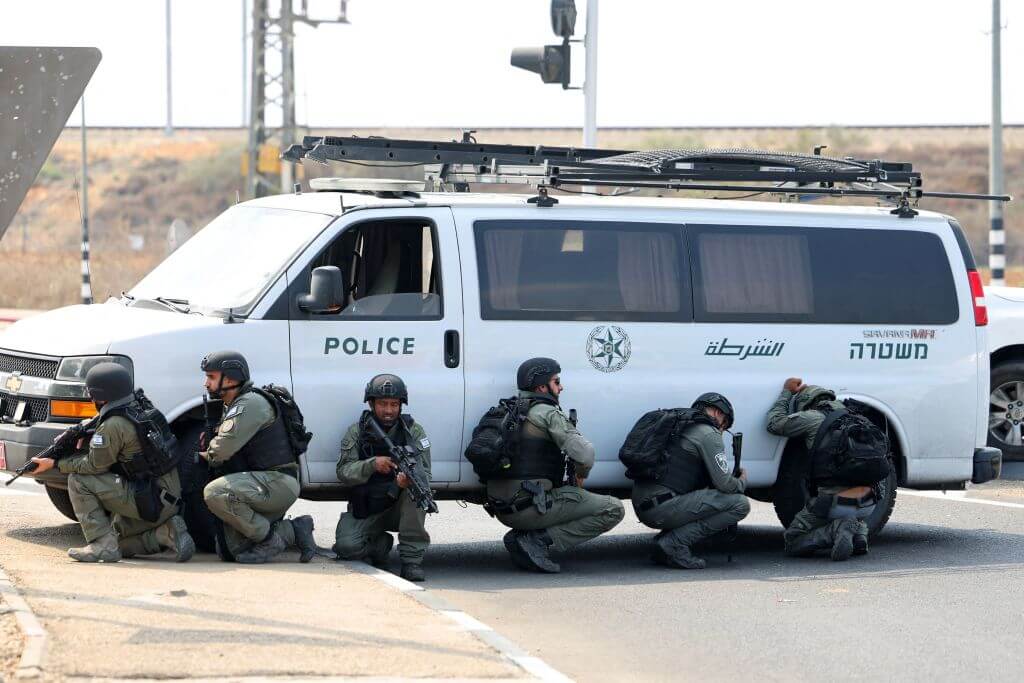‘Nobody is helping us’: Israeli death toll at 700, as Hamas claims some 100 hostages
Families outraged at lack of information from government about people killed or kidnapped from outdoor rave in desert

Israeli security forces take cover during a rocket attack near the southern city of Sderot on October 8, 2023. Photo by Getty Images
Prime Minister Benjamin Netanyahu said on Sunday that Israel faced a “long and difficult war” as it reeled from an unprecedented assault from Hamas militants in the Gaza Strip the day before, saying that its retaliatory attacks on the dense coastal enclave of 2 million Palestinians would “continue with neither limitations nor respite until the objectives have been achieved.”
Israeli news outlets reported Sunday that the at least 700 Israelis had been killed, 2,000 wounded, and an unknown number taken into captivity. The Gaza Health Ministry reported more than 300 dead from airstrikes and gun battles.
Hamas said Sunday that it was holding more than 100 Israelis captive. Ziad al-Nahala, Secretary-General of the separate Gaza-based militant group Islamic Jihad, said late on Sunday that the group was holding an additional 30 Israelis captive.
Hamas continued to send rockets into Israel and Israel pummeled Gaza with airstrikes, as Palestinians in Gaza’s border communities moved south for fear of an Israeli ground assault. On Sunday, the Pentagon announced it would send U.S. ships and aircrafts closer to Israel in a major show of force.
Sunday evening, The Wall Street Journal was the first to report that “Iranian security officials helped plan Hamas’s Saturday surprise attack on Israel and gave the green light for the assault at a meeting in Beirut last Monday.”
Some military breakthroughs were announced Sunday morning, including the freeing of dozens hostages who had been held at Kibbutz Beeri, and of hostages held in a home in the city of Ofakim. But Hamas fighters remained in Israel and an untold number of communities remained besieged. One small town said 15 of its residents had been killed.
Palestinian fighters penetrated Israeli territory by sea, land and air early Saturday morning, bulldozing through the border fence between Israel and Gaza, in the most severe assault on the Jewish State since the Yom Kippur war, which started 50 years and a day before. The attack came on Shabbat and the holiday of Shemini Atzeret, the culmination of a week-long harvest festival, and many Israelis were comparing the psychological impact to what Americans suffered on 9/11.
U.S. Special Antisemitism Envoy Deborah Lipstadt, among the most renowned Holocaust scholars in the world, called the Hamas attacks “the most lethal assault against Jews since the Holocaust.”
The Israeli military said it was still battling Palestinians in seven Israeli border communities and an Army base on Sunday.
One of the most devastating attacks was on an outdoor rave in the desert that had drawn thousands of young people for all-night revelry and dancing. Haaretz reported that Lior Asulin, a former professional soccer star, was among those killed at the party.
Many others were believed kidnapped from the event, and their families complained to Israeli news outlets that the government was not providing enough information about the situation.
“We have no state. I have been looking for my daughter for 27 hours and nobody is helping us,” a woman named Alin Atias cried on Israel’s Channel 13. She said her daughter’s name is Amit Buskila.
“They are not telling us anything. We don’t know what happened to her,” Atias said. “I beg the whole country: Help me find my daughter. Benjamin Netanyahu, I am begging you, send helicopters. Find her, I beg you, please.”
The Times of Israel shared a Facebook post from a woman named Adva Adar who said her 85-year-old grandmother, Yaffa Adar, had been “captured and taken to Gaza.”
“My grandmother established the kibbutz with her own hands, believed in Zionism, in this country that has abandoned her, a hostage,” Adar wrote in Hebrew, along with a photo. “She is apparently thrown somewhere, suffering from severe pain, without medication, without food and without water, dying of fear, alone.”
“And no one is talking to us, no one can tell us anything.”
Meanwhile, Israel’s foreign ministry reported that two Israeli tourists in Egypt had been gunned down along with their local guide. And the Lebanese terror group Hezbollah said it joined the fight, sending artillery and missiles toward three Israeli posts in the country’s north.
Fears were roiling that a second front could open in the north, where Hezbollah, which like Hamas is understood to be a proxy of Iran, operates in Lebanon. Amir Tibon, a Haaretz journalist whose own family was rescued late Saturday from their besieged kibbutz by a battalion including his father, a retired general, cautioned on X that Israelis in the north should prepare themselves for conflict. “We were not prepared properly,” he wrote. “Don’t make this mistake.”
JTA and Haaretz contributed to this report.
A message from our CEO & publisher Rachel Fishman Feddersen
I hope you appreciated this article. Before you go, I’d like to ask you to please support the Forward’s award-winning, nonprofit journalism during this critical time.
At a time when other newsrooms are closing or cutting back, the Forward has removed its paywall and invested additional resources to report on the ground from Israel and around the U.S. on the impact of the war, rising antisemitism and polarized discourse.
Readers like you make it all possible. Support our work by becoming a Forward Member and connect with our journalism and your community.
— Rachel Fishman Feddersen, Publisher and CEO